|
Tags: democracy | DPP | KMT | politics
I. Preface
The word "democracy" has been an indelible part of the past 2500 years of human history. Over such a long period, democracy has been continuously explored, debated, upheld, attacked, ignored, built up, practiced, and destroyed. It has been put into practice time and again. Whatever setbacks it has encountered, democracy has, without question, remained germane to people's lives. Looking at democratic nations around the world, it can be said that most have undergone three phases in their democratic development. The first was a transformation from non-democracy to democracy. The second saw the establishment of various democratic institutions. Finally, democracy was strengthened in a comprehensive manner.
The Republic of China (ROC) was established in 1911 as the first republic in Asia. Even today, it is the only nation a majority of whose citizens are of Han descent to have implemented democracy. A member of the international community, the ROC continues to strengthen its democratic system and intensifies its people's democratic training, while treasuring every step taken in its democratic development. In this way, the nation's democratic forerunners may be remembered, its history relived, and many achievements shown to the world. It is hoped that in this section Taiwan's democratic achievements may be shared with the world.
II. Pioneers of the Times
|
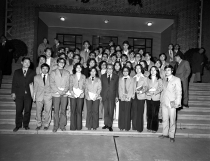
Premier Chiang Ching-kuo (front, 5th right) is seen with students from National Chengchi University outside the Legislative Yuan.
Photo by: GIO Photographer (1976-03-02)
|
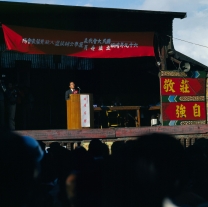
A candidate standing in an election for representatives during the period of mobilization for the suppression of Communist rebellion is seen seeking public support at a campaign rally.
Photo by: GIO Photographer (1980-00-00)
|
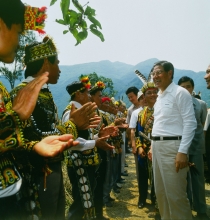
Governor of Taiwan Province Lee Teng-Hui (with glasses) is on an inspection tour of the Aboriginal Culture Park.
Photo by: GIO Photographer (1983-04-16)
|
The establishment, consolidation, and maintenance of democracy are a set of goal-oriented political processes. In addition to meeting objective conditions, various human factors are also crucial. Taiwan's democratic experience is unique. Democracy came about as the result of a gradual, peaceful transformation. Moreover, the world watched as this transformation was led by Taiwan's brightest political minds. Looking back at the twists and turns of Taiwan's democracy over more than 50 years, we can see that the Kuomintang (KMT), members of the dangwai (those not in the KMT), and intellectuals all played important parts. As such, an introduction to the pioneers of democracy is perhaps most appropriate.
The initial force behind freedom and democratic thought in Taiwan were the editors and writers of certain publications. In the 1950s, publications and people representative of this group inlcuded Free China magazine and Hu Shih, Lei Chen, and Yin Hai-kuang . In the 1960s, Li Ao, Lu Shao-chao, and Li Sheng-ting and Literary Star magazine took the stage. Later, top positions in local government were opened up for election as were an increased number of seats in the national legislature, and the promotion of democracy was no longer limited to discussions on paper. But, magazines dedicated to democracy continued to emerge. These included University in the 1970s and Taiwan Political Forum, China Forum, and Formosa magazine in the 1980s. During this phase, intellectuals and members of the dangwai such as Chang Shao-wen, Chen Ku-ying, Chang Chun-hung, Huang Hsin-chieh, Hsu Hsin-liang, and Kang Ning-hsiang gradually forged an alliance with these magazines as a platform, bringing liberal and democratic ideals closer to reality.
Huang Hsin-chieh and Kang Ning-hsiang were elected to public office in 1969, symbolizing the beginning of the phase of action in Taiwan's democracy movement. Kang was elected to the city council after Taipei was upgraded to the status of a special municipality, whereas Huang won the election to become an additional member of the national legislature. This election was the first to be held after the amendment of the Temporary Provisions Effective During the Period of National Mobilization for Suppression of Communist Rebellion. With the election of Kang and Huang, dissidents began, through elections at various levels, to have a political stage from which to operate. The term "dangwai" became the label by which non-KMT candidates were known. On the eve of the 1977 local elections, Kang Ning-hsiang and Huang Hsin-chieh called for organizing a "Provincial Dangwai Alliance to tie together the dangwai candidates. In the end, members of the dangwai won four posts as mayor or county magistrate, 21 seats in the provincial assembly, and 6 seats on the Taipei City Council. Most spectacular was the case of Hsu Hsin-liang, who bolted the Kuomintang to run for magistrate of Taoyuan County and won a landslide victory. On the night when the votes were tallied, some people claimed that the election was rigged, resulting in the bloody "Jungli Incident." The foregoing elections were meaningful because they marked the beginning of an organized dangwai movement and of its having an influence over local affairs.
At the close of 1978, the United States suddenly broke off diplomatic ties with the Republic of China, which caused the government to cancel the planned election for additional members of the national legislature. This cut off this channel for dangwai elements to air their dissident views. They took to the streets to fight for democracy. At the beginning of this strategic change, two major incidents occurred. One was the arrest of Yu Teng-fa and his son in January, sparking the Chiaotou Incident, the first political demonstration to occur in the 30 years martial law had been in place. The second was the Formosa Incident in December of the same year, when members of the dangwai were arrested and tried by military court following a rally on World Human Rights Day.
After the Formosa Incident, the detained dangwai leaders, their defense attorneys, and their family members, including Shih Ming-te, Lin Yi-hsiung, Chen Shui-bian, Frank Chang-ting Hsieh, Su Tseng-chang, Annette Lu, and Chou Chin-yu all came to the fore of the political stage through several elections during the phase of democratic transformation. In the end, they formed the Democratic Progressive Party (DPP) on September 28, 1986, as a challenge to the ban on the formation of political parties set up by martial law. President Chiang Ching-kuo lifted martial law, then in its 38th year, and legalized the formation of political parties in July 1987, allowed visits to China to meet family members in August, and terminated restrictions on newspapers in December. The president took these measures as he realized that conditions had changed and wanted to build a legitimate foundation for Kuomintang rule more consistent with the trends of the day.
After martial law was lifted, democracy in Taiwan advanced by leaps and bounds. This was seen especially when Lee Teng-hui took over as president in 1988 and elected formally as president by the National Assembly in 1990. Lee was a person who sought to promote democratization from within the system. The first popular vote for president and vice president was held in 1996. Lee Teng-hui and his running mate Lien Chan were elected—this time by the people. With a popular mandate, Lee pushed Taiwan's democracy to a new plane, earning the title of "Mr. Democracy" in the international media. In 2000, the DPP's candidates for president and vice president, Chen Shui-bian and Annette Lu, were elected, ending 51 years of Kuomintang rule. Political power was transferred peacefully by means of the democratic mechanism. This peaceful transfer of power has been lauded in the international community as a political miracle which followed on the heels of an economic miracle.
III. Democratic Progress
|
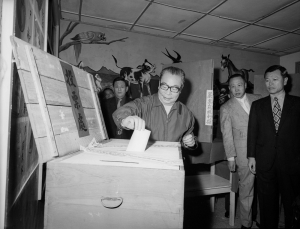
Premier Chiang Ching-kuo casts his ballot in the first supplementary election for members of the Legislative Yuan.
Photo by: GIO Photographer (1975-12-20)
|
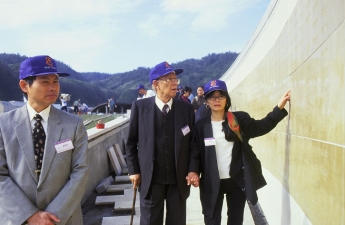 The first human rights monument in Asia, the Green Island Human Rights Memorial, reminds all people that “the era of mother’s weeping” has ended.
The first human rights monument in Asia, the Green Island Human Rights Memorial, reminds all people that “the era of mother’s weeping” has ended.
Photo by: GIO Photographer (1999-12-10)
|
In the past 50-plus years, Taiwan's most important political and social development was the gradual establishment of a democratic system. What most attracted international attention was that the process was gradual and marked by peace and reason. The orderly and measured progression of democracy in Taiwan is described below with the development of democratic thought as framework.
Scholars see democratic thought as having developed in three phases since the central government retreated to Taiwan from China. These were authoritarianism, which lasted from 1945 to 1977; the dangwai movement, which covered the years 1977 to 1985; and the multi-faceted development seen since 1986. The catalysts for phase change were the 1977 elections and the establishment of the DPP in 1986.
In the authoritarian phase, intellectuals took the lead, and magazines like Free China were used as the forum in which democracy was discussed. Although local elections had been held since 1950, they were mainly intended to rally popular support and consolidate the rule of the government. Not until 1969, when regular elections for additional members of the national legislature began to be held, did elections become a platform on which democratic ideals could be realized. At that time, holding campaign rallies or going amongst the people to solicit votes were the most popular campaign tactics. These popularized politics and increased people's political consciousness. This phase may be summed up by the phrase "electoral democracy."
By the second half of the 1970s, more students had completed their studies abroad and returned to Taiwan and, as a result, most intellectuals' view of the meaning of democracy changed gradually from that of an "electoral democracy" to a "constitutional democracy." However, the notions of the general public, which had been influenced by authoritarianism, remained at the stage of "electoral democracy." In other words, ideas of freedom and democracy had germinated, but the true meaning of democracy had yet to be cultivated in the people's hearts.
During the second phase of democratic development, the air was filled with discussion on the modernization, including the political modernization, of the nation. This was also a period of preparation for a democratic transformation. The aforementioned returned scholars and the dangwai figures who had done well in elections came together to present the concept of Western constitutional democracy to the people. They continued to use magazines and elections as their platform to criticize the existent political system and government measures. This laid the foundation for a transformation of political thought and, at the same time, undermined the legitimacy of the authoritarian system.
Bolstered by public opinion and the results of successive elections, and aided by demonstrations and other street activities, the people's pursuit of democracy strengthened. Reaching a critical mass, it culminated in the founding of the DPP on September 28, 1986. In the face of this public challenge to martial law, President Chiang Ching-kuo responded by saying, "The times are changing, the environment is changing, and the trend is changing, so the ruling party must embrace new concepts, take new approaches, and promote reforms." The following year, he lifted martial law, did away with the ban on the formation of new political parties, removed restrictions on newspapers, and allowed Taiwan's people to visit their relatives on the mainland. Taiwan had formally entered the phase of democratic transformation.
In the third phase of democratic development, the people's demand that their government be legitimate was met in the growth of the number of direct elections. For example, the people called for all seats of the National Assembly to be opened to election during the period from 1988 to 1990. As well, the presidency was made a directly elected position from 1996. Looking at the technical aspect, the electoral procedure was gradually perfected. This included the prescription of regulations concerning campaigning and the transparency and speed of vote tallying. Concerning the strengthening of democracy, a long period in which elections at all levels were held and a universalization of the concepts of majority rule and procedural justice, extending even to student elections for class leaders in primary schools. Constitutional democracy is not limited to the expression of the people's will through elections. It also reflects the shortcomings of authoritarianism in evidence before democratic transformation. This involved building institutions such as the nationalization of the armed forces, the establishment of a system of political responsibility, and setting up the rule of law. These are necessary for a democratic system to be consolidated and for the people's democratic training to be furthered.
IV. A Multifaceted Expressions
|
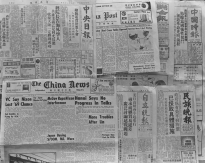
Newspapers are being printed.
Photo by: GIO Photographer (1972-09-01)
|

Vietnamese refugees are sitting outside the Penghu Indochinese Peninsula Refugee Reception Center.
Photo by: GIO Photographer (1979-09-11)
|
 The people of Sanyi Township raise their hands during the 2004 “Hand-in Hand To Safeguard Taiwan” rally.
The people of Sanyi Township raise their hands during the 2004 “Hand-in Hand To Safeguard Taiwan” rally.
Photo by: GIO Photographer (2004-02-28) |
Looking back, and no matter whether the early days under authoritarian rule or the current period in which a democratic transformation has already taken place, it can be said that the people's hopes for, and pursuit of, democracy never failed even as the movement went through period of ups and downs. In the period, the means and methods of spreading and realizing democracy have been reinvented. The meaning of democracy itself has gradually transformed from "electoral democracy" to "constitutional democracy." In light of this, the following speaks to democracy as a concept and Taiwan's specific democratic achievements.
Seeking to establish a relationship with the people of Taiwan and consolidate its power base, the KMT government launched a program of local self-governance in 1950 after coming to Taiwan. Although the government was not trying to implement Western-style democracy, the concepts of majority rule and procedural justice was deeply etched in the minds of the people as a result of a number of successive elections. With the passing of time, direct elections for government heads and representatives were held for increasingly higher offices. Among these were the 1992 election (not merely an election for additional members) for all seats in the national legislature, the 1994 election for Taiwan provincial governor, and the 1996 election for president and vice president. Holding elections for all of the people's representatives was in keeping with the hopes of the people, and has strengthened oversight of government agencies. The direct election of heads of government at all levels also resolved the issues of illegitimacy and illegality faced by the KMT upon its move to Taiwan.
The end of martial law, termination of the ban on new political parties, and removal of restrictions on newspaper publication in 1987 catapulted party politics and freedom of speech to a new stage. According to Ministry of the Interior statistics, by October 2005, the number of political parties had jumped to 113 and political organizations to 39. The DPP established itself as a crucial player in the development of political democracy in Taiwan and became a political power second only to the KMT. In 1993, the New Party came into being. In 2000, the People First Party was organized. In 2001, the Taiwan Solidarity Union was established. These new parties have performed well in elections for central government as well as county and city posts. The lively participation of these five political parties in the political process shows that many different points of view have found expression in Taiwan.
In the early 1980s, people were becoming restless and their energy found release through such outlets as street demonstrations. After martial law was lifted, this force sometimes worked in tandem with the DPP but DPP did not totally absorbed it. This "people power" did not simply wish to resist the authoritarian system, but wanted to struggle to promote its own interests. It found expression in the consumer's movement, labor movement, farmers' movement, environmental protection movement, women's movement, students' movement, and teachers' movement.
This energy was responsible for a camp-out by homeless people one night in August 1999 on Zhongxiao East Road and demonstrations in February 2001 against the construction of the fourth nuclear power plant. The focus of these activities was not political but rather the concerns of the people. When their activities touch on the political, their aim remains the people's well-being, like the 1990 student action the Wild Lily Movement and the February 2004 Hand in Hand Across Taiwan rally, held to show support for Taiwan’s defense. In conclusion, the growing appeal of social movements suggests that the people are now the dominant force in many arenas.
Taiwan Image - Photo Archive
Text and images are provided by Ministry of Foreign Affairs, Republic of China (TAIWAN)
|




















